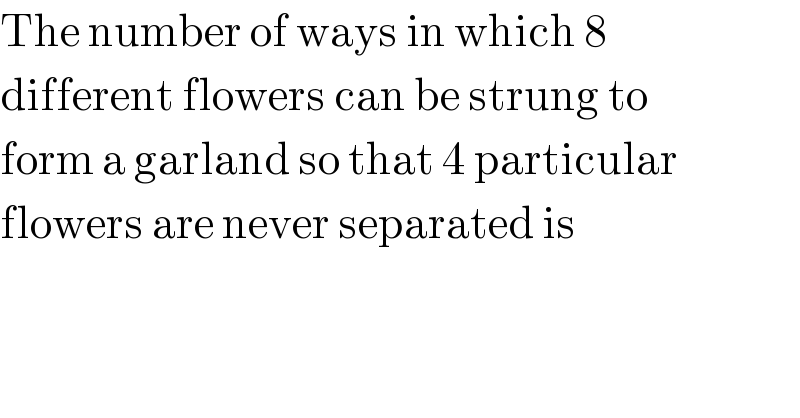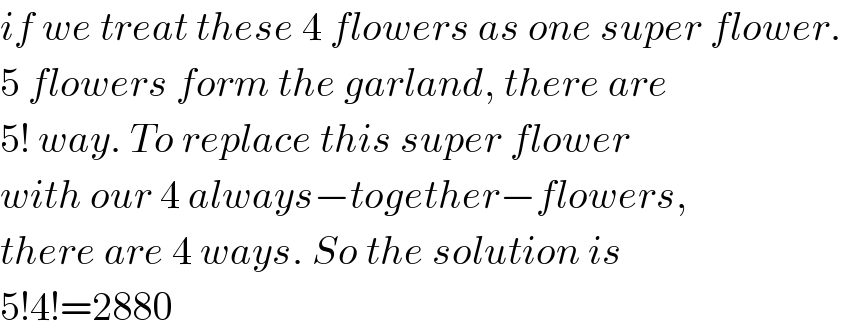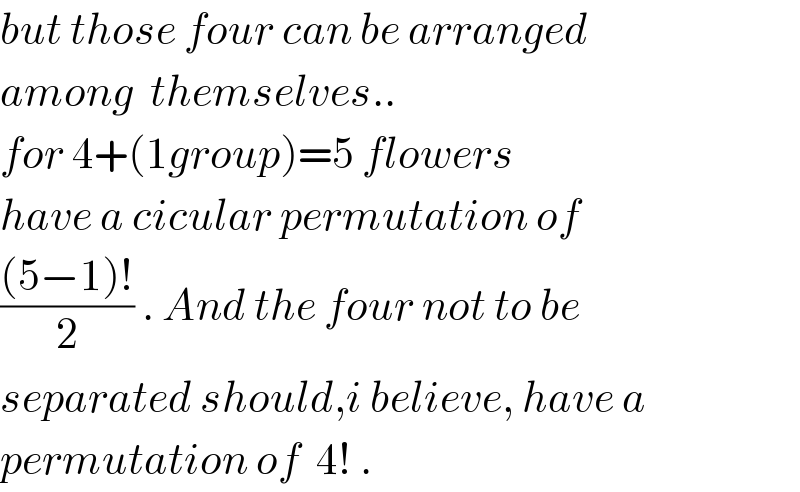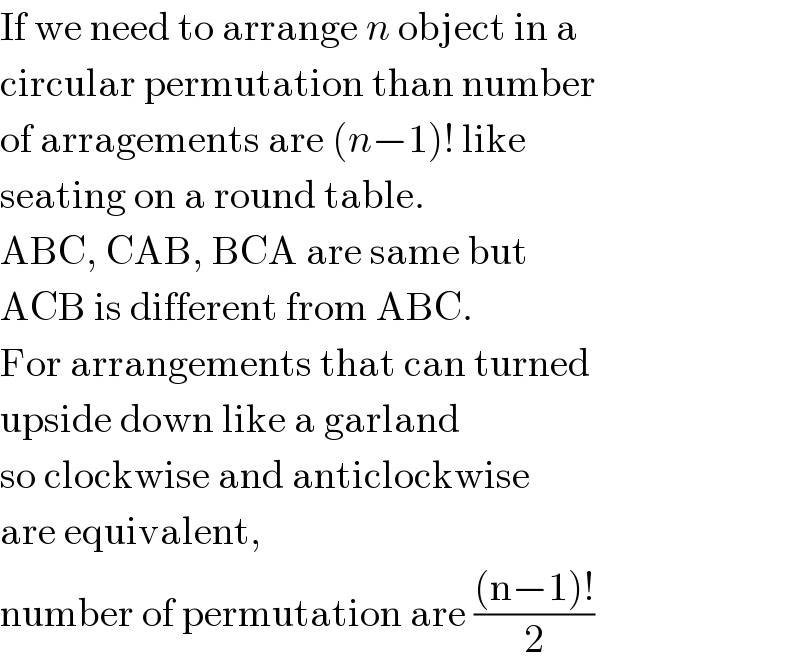Question Number 11889 by murtaza8 last updated on 04/Apr/17

$$\mathrm{The}\:\mathrm{number}\:\mathrm{of}\:\mathrm{ways}\:\mathrm{in}\:\mathrm{which}\:\mathrm{8}\: \\ $$$$\mathrm{different}\:\mathrm{flowers}\:\mathrm{can}\:\mathrm{be}\:\mathrm{strung}\:\mathrm{to} \\ $$$$\mathrm{form}\:\mathrm{a}\:\mathrm{garland}\:\mathrm{so}\:\mathrm{that}\:\mathrm{4}\:\mathrm{particular} \\ $$$$\mathrm{flowers}\:\mathrm{are}\:\mathrm{never}\:\mathrm{separated}\:\mathrm{is} \\ $$
Answered by ajfour last updated on 04/Apr/17

$$\frac{\left(\mathrm{5}−\mathrm{1}\right)!}{\mathrm{2}}\left(\mathrm{4}!\right) \\ $$
Commented by ajfour last updated on 04/Apr/17

Commented by mrW1 last updated on 04/Apr/17

$${Can}\:{you}\:{please}\:{explain}\:{your}\:{solution}? \\ $$$${I}\:{think}\:{he}\:{meant}\:{that}\:\mathrm{4}\:{special}\:{flowers} \\ $$$${should}\:{always}\:{chosen}\:{together}. \\ $$
Commented by mrW1 last updated on 04/Apr/17

$${if}\:{we}\:{treat}\:{these}\:\mathrm{4}\:{flowers}\:{as}\:{one}\:{super}\:{flower}. \\ $$$$\mathrm{5}\:{flowers}\:{form}\:{the}\:{garland},\:{there}\:{are} \\ $$$$\mathrm{5}!\:{way}.\:{To}\:{replace}\:{this}\:{super}\:{flower} \\ $$$${with}\:{our}\:\mathrm{4}\:{always}−{together}−{flowers}, \\ $$$${there}\:{are}\:\mathrm{4}\:{ways}.\:{So}\:{the}\:{solution}\:{is} \\ $$$$\mathrm{5}!\mathrm{4}!=\mathrm{2880} \\ $$
Commented by mrW1 last updated on 04/Apr/17

$${Sorry},\:{I}\:{understand}\:{that}\:{the}\:{garland} \\ $$$${should}\:{consist}\:{of}\:\mathrm{4}\:{flowers}. \\ $$
Commented by ajfour last updated on 04/Apr/17

$${but}\:{those}\:{four}\:{can}\:{be}\:{arranged} \\ $$$${among}\:\:{themselves}.. \\ $$$${for}\:\mathrm{4}+\left(\mathrm{1}{group}\right)=\mathrm{5}\:{flowers} \\ $$$${have}\:{a}\:{cicular}\:{permutation}\:{of} \\ $$$$\frac{\left(\mathrm{5}−\mathrm{1}\right)!}{\mathrm{2}}\:.\:{And}\:{the}\:{four}\:{not}\:{to}\:{be} \\ $$$${separated}\:{should},{i}\:{believe},\:{have}\:{a}\: \\ $$$${permutation}\:{of}\:\:\mathrm{4}!\:. \\ $$
Commented by ajfour last updated on 04/Apr/17

$${if}\:{there}\:{are}\:\mathrm{3}\:{different}\:{flowers}\: \\ $$$${to}\:{form}\:{a}\:{garland}\:{we}\:{have} \\ $$$$\frac{\left(\mathrm{3}−\mathrm{1}\right)!}{\mathrm{2}}\:=\mathrm{1}\:{way}\:{and}\:{that}'{s}\:{true}. \\ $$
Commented by prakash jain last updated on 04/Apr/17

$$\mathrm{If}\:\mathrm{we}\:\mathrm{need}\:\mathrm{to}\:\mathrm{arrange}\:{n}\:\mathrm{object}\:\mathrm{in}\:\mathrm{a} \\ $$$$\mathrm{circular}\:\mathrm{permutation}\:\mathrm{than}\:\mathrm{number} \\ $$$$\mathrm{of}\:\mathrm{arragements}\:\mathrm{are}\:\left({n}−\mathrm{1}\right)!\:\mathrm{like} \\ $$$$\mathrm{seating}\:\mathrm{on}\:\mathrm{a}\:\mathrm{round}\:\mathrm{table}. \\ $$$$\mathrm{ABC},\:\mathrm{CAB},\:\mathrm{BCA}\:\mathrm{are}\:\mathrm{same}\:\mathrm{but} \\ $$$$\mathrm{ACB}\:\mathrm{is}\:\mathrm{different}\:\mathrm{from}\:\mathrm{ABC}. \\ $$$$\mathrm{For}\:\mathrm{arrangements}\:\mathrm{that}\:\mathrm{can}\:\mathrm{turned} \\ $$$$\mathrm{upside}\:\mathrm{down}\:\mathrm{like}\:\mathrm{a}\:\mathrm{garland}\: \\ $$$$\mathrm{so}\:\mathrm{clockwise}\:\mathrm{and}\:\mathrm{anticlockwise} \\ $$$$\mathrm{are}\:\mathrm{equivalent}, \\ $$$$\mathrm{number}\:\mathrm{of}\:\mathrm{permutation}\:\mathrm{are}\:\frac{\left(\mathrm{n}−\mathrm{1}\right)!}{\mathrm{2}} \\ $$
Commented by mrW1 last updated on 06/Apr/17

$${thanks}! \\ $$
